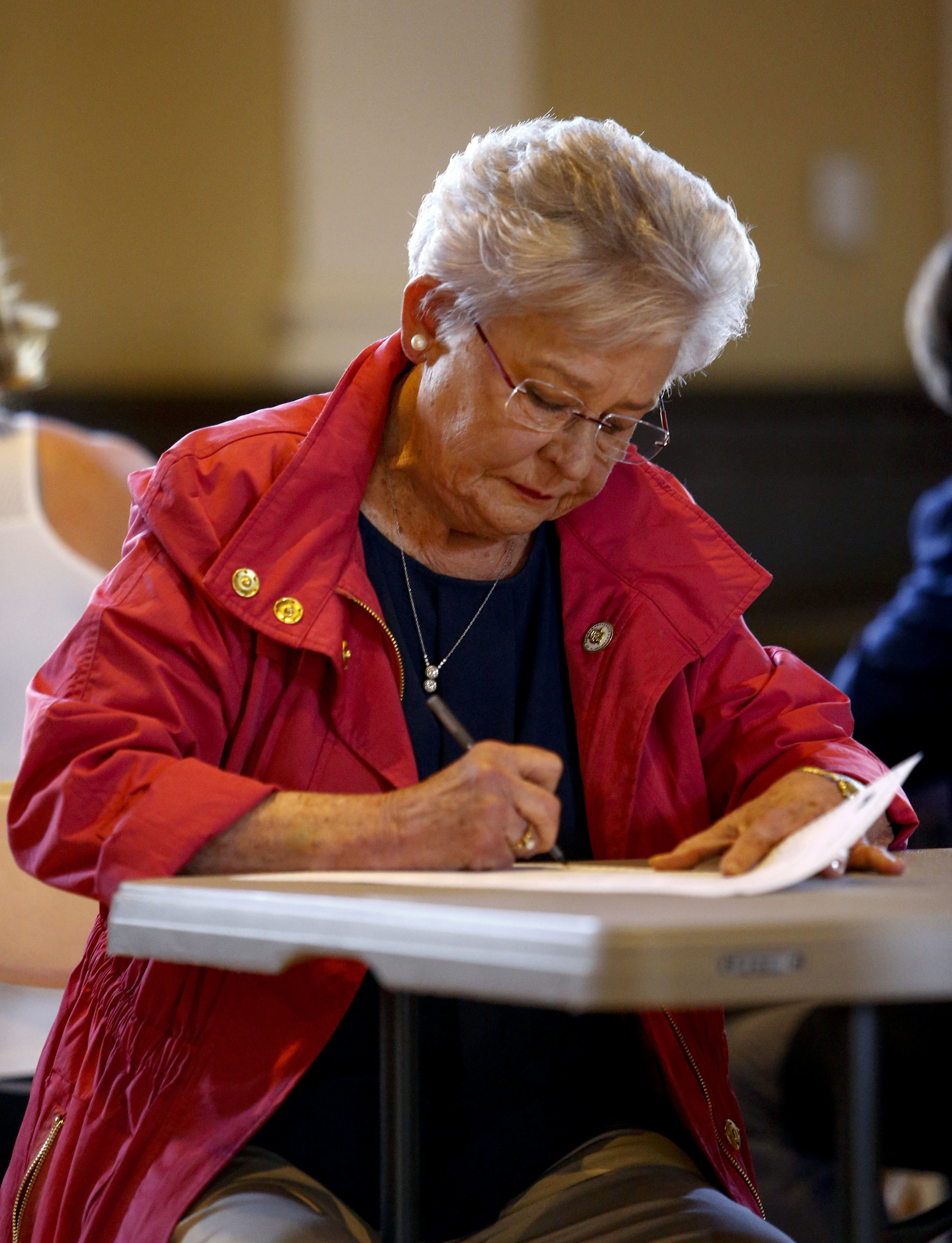Alabama governor signs IVF bill giving patients, providers legal cover

Alabama Gov. Kay Ivey cast her vote in Alabama's primary election at Huntingdon College, Tuesday, June 5, 2018, in Montgomery, Alabama. (AP Photo/Butch Dill)
Alabama Gov. Kay Ivey (R) on Wednesday signed a bill to protect providers and patients doing in vitro fertilization from legal liability if embryos they create are damaged or destroyed, a move that comes weeks after a state Supreme Court ruling threatened the treatment’s use.
The bill, signed into law less than three weeks after the Alabama Supreme Court ruled that frozen embryos are people and individuals could be held liable for destroying them, gives criminal and civil immunity “for death or damage to an embryo” related to IVF. The unprecedented ruling alarmed medical professionals and reproductive rights advocates, who warned it would jeopardize IVF access in the state. Several Alabama providers halted IVF treatments within days of the decision.
Ivey has been vocal about protecting IVF, joining Republicans across the country who have defended the treatment, distancing themselves from the ruling. In a statement late Wednesday, Ivey applauded the state legislature for what she called a “stop-gap measure” that will allow fertility clinics that had closed after the ruling to reopen.
“Let me say clearly: Alabama supports growing families through IVF,” Ivey said. “From protecting the unborn to supporting IVF, Alabama is proud we are a pro-life, pro-family state.”
The University of Alabama at Birmingham, which stopped treatments after the ruling, said in a statement after Ivey’s signing that it was “moving to promptly resume” treatments.
The law also shields “manufacturers of goods used to facilitate” IVF or the transport of embryos from criminal charges, but stops short of providing blanket immunity for those companies.
While the law provides legal immunity for clinics that provide IVF treatments, it does not stipulate whether frozen embryos are people, as the Alabama Supreme Court said in its ruling.
During debates before the bill was sent to Ivey’s desk, Alabama lawmakers acknowledged that even with the protective legislation, the state still had questions to contend with, including about personhood and when life begins. Alabama last defined when life begins in a 2018 constitutional amendment that protected the “rights of unborn children” and was cited in the state Supreme Court’s ruling last month.
On the House floor, state Rep. Terri Collins (R), who sponsored the chamber’s measure, said the legislation created a “broad immunity.”
“This is our best solution to help the families that are in the middle of that process continue their process,” Collins said.
On the House floor Wednesday, state Rep. Phillip Ensler (D) said he hoped the state would look at the “bigger picture” after the fast-tracked legislation was passed to fortify IVF and other reproductive care against future court challenges.
“This is what I see as a temporary, kind of Band-Aid fix, which is better than nothing,” Ensler said of the new bill.
Still, advocates have praised the legislation as a necessity for families undergoing IVF to resume their treatment with legal protections.
Following the state Supreme Court’s ruling, Alabama’s legislature rushed to protect IVF treatment in response. When both chambers met on Feb. 29 to vote on protective measures, nearly half of Alabama’s seven clinics had paused their treatments, and three of the remaining four stopped frozen embryo disposal.
The House and Senate voted for the measures almost unanimously that day before reconciling them this week and sending a final bill to Ivey’s desk.
Reproductive rights advocates view the law as a victory for women in Alabama. But it might be a fleeting one, Robin Marty, executive director of West Alabama Women’s Center in Tuscaloosa, told the Washington Post last week.
“Providing legal rights to the unborn at any age of gestation is always going to be a legal mess,” she said.
Molly Hennessy-Fiske, Kim Bellware and Maham Javaid contributed to this report.



